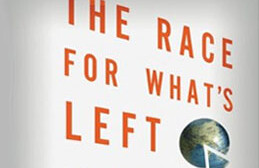Framing ethical perspectives
Emerging Technologies are technologies whose development and/or practical applications are still largely unrealized. Carnegie Council’s events, experts, and initiatives focus on the emergence of artificial intelligence (AI) and related technologies and aim to map the field, illuminate topics requiring further research, and build a diverse community of experts, with the goal of ensuring that these systems are developed and deployed in a just, responsible, and inclusive manner.
Featured Emerging Technology Resources
Artificial intelligence, climate-altering technologies, and more
SEP 12, 2024 • Article
From Principles to Action: Charting a Path for Military AI Governance
MAR 26, 2024 • Podcast
When the War Machine Decides: Algorithms, Secrets, and Accountability in Modern Conflict, with Brianna Rosen
Arthur Holland Michel and Oxford's Brianna Rosen discuss the war in Gaza, the U.S. drone program, and algorithmic decisions, transparency, and accountability.
APR 9, 2024 • Video
Algorithms of War: The Use of AI in Armed Conflict
From Gaza to Ukraine, the military applications of AI are fundamentally reshaping the ethics of war. How should policymakers navigate AI’s inherent trade-offs?
Related Initiatives
Carnegie Ethics Accelerator
The Carnegie Ethics Accelerator is a new kind of incubator designed to empower ethics in the face of swiftly evolving challenges in technology and public policies.
Explore Our Emerging Technology Resources

JUN 28, 2012 • Article
Policy Innovations Digital Magazine (2006-2016): Commentary: Globalizing Censorship
Consent of the Network by Rebecca MacKinnon is a must-read on how businesses and governments wield influence over the Internet.

JUN 21, 2012 • Podcast
The Leaderless Revolution: How Ordinary People Will Take Power and Change Politics in the 21st Century
Countries the world over are suffering from a deficit of democracy, says Carne Ross, and it's not enough just to protest and/or tinker with ...
JUN 18, 2012 • Podcast
How Much is Enough?: Money and the Good Life
Our obsession with amassing ever more wealth is actually robbing us of the good life, argue Robert and Edward Skidelsky. They identify seven basic needs ...
JUN 15, 2012 • Podcast
Global Ethics Corner: The Ethics of Cyber Warfare
An influential Russian engineer recently called for an international ban on cyber weapons, saying that they could have unforeseen consequences, but many American analysts disagree. ...

JUN 8, 2012 • Podcast
Law Professor Stuart Green on Property Law
A meme about illegal music downloads has been going around the Internet for a few years now. It goes something like this: Piracy isn't theft. ...
JUN 6, 2012 • Podcast
Supply Chain Accountability
How can ethical practices be made an integral part of overseas supply chains? Here's reporter Charles Duhigg on how habits can impact the ethical behavior ...
MAY 29, 2012 • Podcast
Exit Interview
Overall, former president of ABC News David Westin is optimistic about the future of journalism. But it's increasingly up to us, the public, to weigh ...
APR 5, 2012 • Podcast
Global Ethics Corner: Daisey and Foxconn: Is Exaggeration Acceptable When Raising Awareness?
Mike Daisey has admitted to fabricating parts of his story on Foxconn for "This American Life." But, perhaps partly due to the attention his story ...

APR 2, 2012 • Article
Two Faces of Apple
On the customer side, Apple is one of the world's most innovative and successful companies. But when it comes to working conditions at its plants ...

MAR 26, 2012 • Podcast
The Race for What's Left: The Global Scramble for the World's Last Resources
As we run out of resources, the human race is at a pivotal point. We have two options: We can continue along the same path, ...



